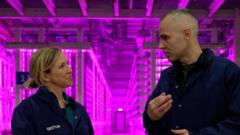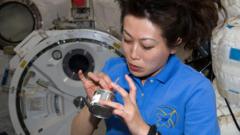Amid Iceland's stunning landscape, Vaxa Technologies has created a futuristic farm, harnessing geothermal energy to cultivate microalgae - a nutrient-dense food source. The facility thrives under pink-purple lights in a high-tech warehouse, growing varieties of microalgae essential for human and animal nutrition. General manager Kristinn Haflidason describes this as "a new way of thinking about food production."
Located 35 minutes from Reykjavik, Vaxa leverages the clean electricity and resources from a nearby geothermal plant, creating a carbon-negative production system. The farm specifically harnesses Nannochloropsis and Arthospira - the latter known as spirulina when dried. These microalgae are high in protein, omega-3 fatty acids, and vitamins, making them a potentially powerful weapon in the fight against food insecurity.
While the facility can produce up to 150 metric tonnes of algae annually, it reflects a growing trend; the global market for microalgae is projected to reach $25.4 billion by 2033. But the venture isn't without challenges. Experts like food scientist Malene Lihme Olsen emphasize the need for further research into microalgae's digestibility and taste.
Despite hurdles, Vaxa is optimistic about the future. They believe that microalgae's environmental benefits and rich nutritional profile could revolutionize our diets. Back at the farm, Haflidason invites curious souls to taste the 'green sludge.' With a flavor described as neutral, it’s set to become a key ingredient in everyday foods like bread and smoothies, paving the way for a greener, healthier future.
Located 35 minutes from Reykjavik, Vaxa leverages the clean electricity and resources from a nearby geothermal plant, creating a carbon-negative production system. The farm specifically harnesses Nannochloropsis and Arthospira - the latter known as spirulina when dried. These microalgae are high in protein, omega-3 fatty acids, and vitamins, making them a potentially powerful weapon in the fight against food insecurity.
While the facility can produce up to 150 metric tonnes of algae annually, it reflects a growing trend; the global market for microalgae is projected to reach $25.4 billion by 2033. But the venture isn't without challenges. Experts like food scientist Malene Lihme Olsen emphasize the need for further research into microalgae's digestibility and taste.
Despite hurdles, Vaxa is optimistic about the future. They believe that microalgae's environmental benefits and rich nutritional profile could revolutionize our diets. Back at the farm, Haflidason invites curious souls to taste the 'green sludge.' With a flavor described as neutral, it’s set to become a key ingredient in everyday foods like bread and smoothies, paving the way for a greener, healthier future.





















